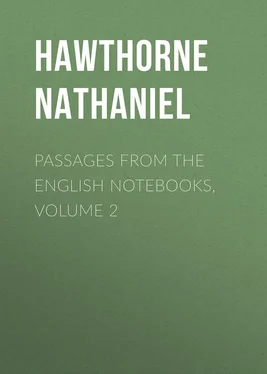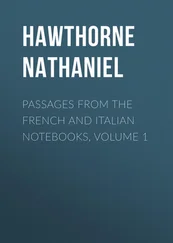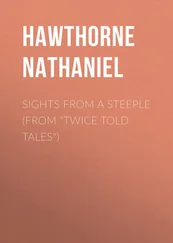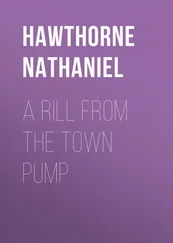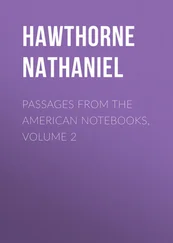Nathaniel Hawthorne - Passages from the English Notebooks, Volume 2
Здесь есть возможность читать онлайн «Nathaniel Hawthorne - Passages from the English Notebooks, Volume 2» — ознакомительный отрывок электронной книги совершенно бесплатно, а после прочтения отрывка купить полную версию. В некоторых случаях можно слушать аудио, скачать через торрент в формате fb2 и присутствует краткое содержание. Жанр: literature_19, foreign_antique, foreign_prose, на английском языке. Описание произведения, (предисловие) а так же отзывы посетителей доступны на портале библиотеки ЛибКат.
- Название:Passages from the English Notebooks, Volume 2
- Автор:
- Жанр:
- Год:неизвестен
- ISBN:нет данных
- Рейтинг книги:5 / 5. Голосов: 1
-
Избранное:Добавить в избранное
- Отзывы:
-
Ваша оценка:
- 100
- 1
- 2
- 3
- 4
- 5
Passages from the English Notebooks, Volume 2: краткое содержание, описание и аннотация
Предлагаем к чтению аннотацию, описание, краткое содержание или предисловие (зависит от того, что написал сам автор книги «Passages from the English Notebooks, Volume 2»). Если вы не нашли необходимую информацию о книге — напишите в комментариях, мы постараемся отыскать её.
Passages from the English Notebooks, Volume 2 — читать онлайн ознакомительный отрывок
Ниже представлен текст книги, разбитый по страницам. Система сохранения места последней прочитанной страницы, позволяет с удобством читать онлайн бесплатно книгу «Passages from the English Notebooks, Volume 2», без необходимости каждый раз заново искать на чём Вы остановились. Поставьте закладку, и сможете в любой момент перейти на страницу, на которой закончили чтение.
Интервал:
Закладка:
April 8th. – On Saturday evening, at ten o'clock, I went to a supper-party at Mr. D – 's, and there met five or six people, – Mr. Faed, a young and distinguished artist; Dr. Eliotson, a dark, sombre, taciturn, powerful-looking man, with coal-black hair, and a beard as black, fringing round his face; Mr. Charles Reade, author of Christie Johnstone and other novels, and many plays, – a tall man, more than thirty, fair-haired, and of agreeable talk and demeanor.
On April 6th, I went to the Waterloo station, and there meeting Bennoch and Dr. – , took the rail for Woking, where we found Mr. Hall's carriage waiting to convey us to Addlestone, about five miles off. On arriving we found that Mr. and Mrs. Hall had not yet returned from church. Their place is an exceedingly pretty one, and arranged in very good taste. The house is not large; but is filled, in every room, with fine engravings, statuettes, ingenious prettinesses or beautifulnesses in the way of flower-stands, cabinets, and things that seem to have bloomed naturally out of the characters of its occupants. There is a conservatory connected with the drawing-room, and enriched with lovely plants, one of which has a certain interest as being the plant on which Coleridge's eyes were fixed when he died. This conservatory is likewise beautified with several very fine casts of statues by modern sculptors, among which was the Greek Slave of Powers, which my English friends criticised as being too thin and meagre; but I defended it as in accordance with American ideas of feminine beauty. From the conservatory we passed into the garden, but did not minutely examine it, knowing that Mr. Hall would wish to lead us through it in person. So, in the mean time, we took a walk in the neighborhood, over stiles and along by-paths, for two or three miles, till we reached the old village of Chertsey. In one of its streets stands an ancient house, gabled, and with the second story projecting over the first, and bearing an inscription to the purport that the poet Cowley had once resided, and, I think, died there. Thence we passed on till we reached a bridge over the Thames, which at this point, about twenty-five miles from London, is a narrow river, but looks clean and pure, and unconscious what abominations the city sewers will pour into it anon. We were caught in two or three showers in the course of our walk; but got back to Firfield without being very much wetted.
Our host and hostess had by this time returned from church, and Mrs. Hall came frankly and heartily to the door to greet us, scolding us (kindly) for having got wet… I liked her simple, easy, gentle, quiet manners, and I liked her husband too.
He has a wide and quick sympathy, and expresses it freely… The world is the better for him.
The shower being now over, we went out upon the beautiful lawn before his house, where there were a good many trees of various kinds, many of which have been set out by persons of great or small distinction, and are labelled with their names. Thomas Moore's name was appended to one; Maria Edgeworth's to another; likewise Fredrika Bremer's, Jenny Lind's; also Grace Greenwood's, and I know not whose besides. This is really a pleasant method of enriching one's grounds with memorials of friends, nor is there any harm in making a shrubbery of celebrities. Three holes were already dug, and three new trees lay ready to be planted, and for me there was a sumach to plant, – a tree I never liked; but Mr. Hall said that they had tried to dig up a hawthorn, but found it clung too fast to the soil. So, since better might not be, and telling Mr. Hall that I supposed I should have a right to hang myself on this tree whenever I chose, I seized a spade, and speedily shovelled in a great deal of dirt; and there stands my sumach, an object of interest to posterity! Bennoch also and Dr. – set out their trees, and indeed, it was in some sense a joint affair, for the rest of the party held up each tree, while its godfather shovelled in the earth; but, after all, the gardener had more to do with it than we. After this important business was over, Mr. Hall led us about his rounds, which are very nicely planned and ordered; and all this he has bought, and built, and laid out, from the profits of his own and his wife's literary exertions.
We dined early, and had a very pleasant dinner, and, after the cloth was removed, Mr. Hall was graciously pleased to drink my health, following it with a long tribute to my genius. I answered briefly; and one half of my short speech was in all probability very foolish..
After the ladies (there were three, one being a girl of seventeen, with rich auburn hair, the adopted daughter of the Halls) had retired, Dr. – having been toasted himself, proposed Mrs. Hall's health.
I did not have a great deal of conversation with Mrs. Hall; but enough to make me think her a genuine and good woman, unspoilt by a literary career, and retaining more sentiment than even most girls keep beyond seventeen. She told me that it had been the dream of her life to see Longfellow and myself!.. Her dream is half accomplished now, and, as they say Longfellow is coming over this summer, the remainder may soon be rounded out. On taking leave, our kind hosts presented me with some beautiful flowers, and with three volumes of a work, by themselves, on Ireland; and Dr. – was favored also with some flowers, and a plant in a pot, and Bennoch too had his hands full… and we went on our way rejoicing.
[Here follows an account of the Lord Mayor's dinner, taken mostly for Our Old Home; but I think I will copy this more exact description of the lady mentioned in "Civic Banquets." – ED.]
… My eyes were mostly drawn to a young lady, who sat nearly opposite me, across the table. She was, I suppose, dark, and yet not dark, but rather seemed to be of pure white marble, yet not white; but the purest and finest complexion, without a shade of color in it, yet anything but sallow or sickly. Her hair was a wonderful deep raven-black, black as night, black as death; not raven-black, for that has a shiny gloss, and hers had not, but it was hair never to be painted nor described, – wonderful hair, Jewish hair. Her nose had a beautiful outline, though I could see that it was Jewish too; and that, and all her features, were so fine that sculpture seemed a despicable art beside her, and certainly my pen is good for nothing. If any likeness could be given, however; it must be by sculpture, not painting. She was slender and youthful, and yet had a stately and cold, though soft and womanly grace; and, looking at her, I saw what were the wives of the old patriarchs in their maiden or early-married days, – what Judith was, for, womanly as she looked, I doubt, not she could have slain a man in a just cause, – what Bathsheba was, only she seemed to have no sin in her, – perhaps what Eve was, though one could hardly think her weak enough to eat the apple… Whether owing to distinctness of race, my sense that she was a Jewess, or whatever else, I felt a sort of repugnance, simultaneously with my perception that she was an admirable creature.
THE HOUSE OF COMMONS
At ten o'clock the next day [after the Lord Mayor's dinner] I went to lunch with Bennoch, and afterwards accompanied him to one of the government offices in Downing Street. He went thither, not on official business, but on a matter connected with a monument to Miss Mitford, in which Mr. Harness, a clergyman and some sort of a government clerk, is interested. I gathered from this conversation that there is no great enthusiasm about the monumental affair among the British public. It surprised me to hear allusions indicating that Miss Mitford was not the invariably amiable person that her writings would suggest; but the whole drift of what they said tended, nevertheless, towards the idea that she was an excellent and generous person, loved most by those who knew her best.
Читать дальшеИнтервал:
Закладка:
Похожие книги на «Passages from the English Notebooks, Volume 2»
Представляем Вашему вниманию похожие книги на «Passages from the English Notebooks, Volume 2» списком для выбора. Мы отобрали схожую по названию и смыслу литературу в надежде предоставить читателям больше вариантов отыскать новые, интересные, ещё непрочитанные произведения.
Обсуждение, отзывы о книге «Passages from the English Notebooks, Volume 2» и просто собственные мнения читателей. Оставьте ваши комментарии, напишите, что Вы думаете о произведении, его смысле или главных героях. Укажите что конкретно понравилось, а что нет, и почему Вы так считаете.
